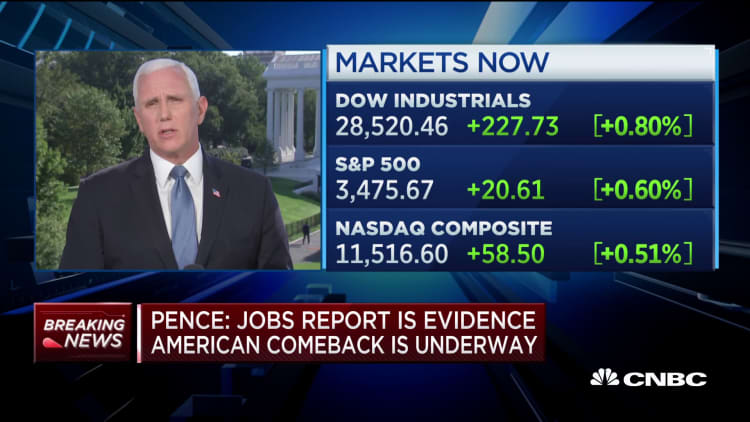Millions of Americans who are eagerly waiting for a second round of $1,200 stimulus checks may be relieved to know those payments are still a priority for Washington lawmakers.
But Republicans and Democrats in Congress must first end their stalemate and approve the next coronavirus relief bill before Americans can get their hands on that money.
More from Personal Finance:
Sept. 1 is the first day of the payroll tax holiday
Five key things workers should know about the payroll tax deferral
How the CARES Act failed to protect tenants from eviction
Vice President Mike Pence reaffirmed the White House's commitment to sending more stimulus checks to Americans in an interview with CNBC's "Squawk on the Street" on Friday.
"Nobody wants to give direct payments to American families more than President Donald Trump," Pence said. "We sent those checks to American families.
"It helped people through this tough time."
Who could get the $1,200 payments
"You could easily see another round of stimulus checks that was exactly the same as the previous round, or more or less the same," said Mark Mazur, director of the Urban-Brookings Tax Policy Center.
Congress authorized those first checks when it passed the CARES Act in March. The payments included up to $1,200 per individual or $2,400 per married couple, plus $500 per child under age 17.
Full payments were sent to individuals who earned up to $75,000, heads of household with up to $112,500 in income and married couples who file jointly making up to $150,000.

But those payments were gradually reduced for income above those limits, and phased out completely for individuals with adjusted gross income above $99,000, heads of household over $136,500 and married couples above $198,000.
Those who have little to no income or who rely on federal support — such as Social Security, Supplemental Security Income or veterans benefits — also qualified for payments.
What could change with the second checks
Both sides of the aisle have proposed some changes for the second round.
House Democrats have proposed giving $1,200 checks again, but this time raising dependent money to $1,200 for a maximum of three children. Families would then be eligible for up to $6,000.
The Democrats' plan also calls for eliminating the age cap on dependent pay. They also want nonresident aliens to be eligible for the money.
Politically, some of the people in the White House might think it's a good thing to get a check signed by Donald Trump right before the election.Bill Hoaglandsenior vice president at the Bipartisan Policy Center
Senate Republicans proposed a bill that called for $1,200 checks for adults and $500 for dependents. Their plan also calls for eliminating the age cap for dependents.
The fastest way to deploy the second payments would be to keep the same terms, Mazur said. Making more people eligible for the dependent pay would likely add a couple of weeks to how long it would take to distribute the checks, he said.
How long it would take to receive the payments
If Congress passes legislation authorizing the second checks this month, it may not be until October or later before people receive the money, according to Bill Hoagland, senior vice president at the Bipartisan Policy Center.
The upcoming election may provide an additional incentive to approve the money as soon as possible.
"Politically, some of the people in the White House might think it's a good thing to get a check signed by Donald Trump right before the election," Hoagland said.
Those who have their direct deposit information on file with the IRS would likely be first in line to receive the money. Others who have not received the first checks could face a longer wait.
The IRS has issued an Oct. 15 deadline for individuals who typically do not file tax returns to submit their information to the agency in order to get their payments this year.


